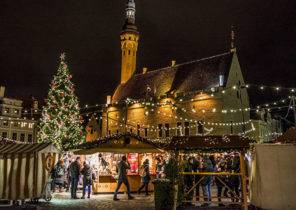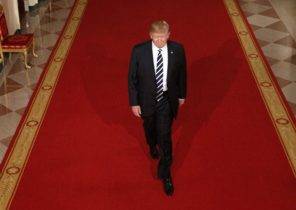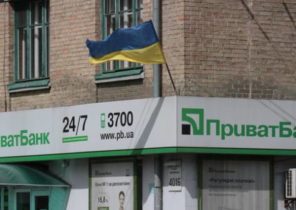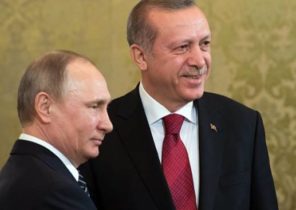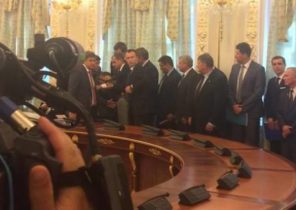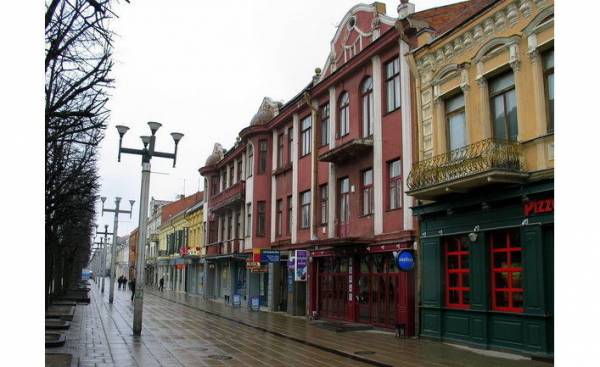
Kaunas, 5 in the morning. I left the hotel to smoke. On the porch were the reception — the young blonde guy in the jacket. For the whole journey through the Baltic countries he was one of the few who did not speak Russian and was surprisingly far from this discourse. We got to talking, he started asking about what I write.
I told him about foreign policy issues, historical trauma, intense bilateral rhetoric. Of course, he was aware of it, but perceived as completely different, parallel world. He was interested in learning, securities and Forex, and intrigue and recriminations caused a skeptical smile. He spoke with interest of the entomologist, razglyadyvaya rare butterfly dried.
After we discussed the problems of the postcolonial world, right turn and convulsions of Imperial thinking, was a pause. And then he said, “And when all this hell will end?” “I don’t know. Perhaps we should rely on generational dynamics?” I replied. “Well, that is to wait until the people with a cold war in the head just dies?” “It turns out that Yes.” The conversation was strange. At first I didn’t give it a value, but as we passed city after city, country after country, it became clear that it was something important.
Because all the subjects of this project were at some time, the cultural and philosophical rift. But on both sides of the dividing features — a question that had to be answered. How it to understand? Just enough to get in the car, be patient and drive until my eyes start to bleed from road ripples. This is a very strange journey, which will meet the monstrous ghosts of the past, fragments of a stillborn social projects and side effects utopias.
Ruins and monuments, fragments of phrases, words, derived a balloon at the walls, the names of the dishes, songs, Newspapers and TV shows — all absorbed the smell of iron and blood, and then scattered on all four sides, like drops of mercury from a broken thermometer. Somewhere near the Eastern border of Latvia, we stopped in a tiny village. It’s been a few stumbles in random homes and apartment panel beater.
In the yards the men chopped wood and women put them in the woodpile. Leaning against the shed, on the bench rested the lady. I thought these have long disappeared from the face of the Earth: it was absolutely canonical, which hardly will meet somewhere in the Siberian wilderness. Coat of the time when Khrushchev was still nothing; with a kerchief on her head with a shopping bag and a cane, with some amazing and absolutely unique Soviet squint, you can see only in the movies of the early thaw. She gazed thoughtfully at the centre of a small pond, until we activated it kind of stupid question.
And here we have shed abundant, hasty and unstoppable Russian speech interspersed with strange words and sounds that are understandable to her. An elderly woman in two minutes told about his life: how pension is not enough even for food; as here pouezzhalo all who could, and in fact was once a farm; like girlfriends got her to go vote, even though she does not believe all this and sees no point, but the Chapter elected a new and cute. I always had the feeling that I’m somewhere already heard fifteen years ago in some abandoned village.
It was really amazing, but the old lady almost did not speak Latvian and seemed to have stayed in some other world and time when things were a little better — the people are friendlier, food tastes better, friends are younger. She was a living artifact of a long-vanished reality, as the village in which we met her. And this is not an isolated story. The Eastern border of Latvia and Lithuania suggest the strange thoughts that some fifty years, and these areas are completely empty, they will have to rediscover, to learn and settle again. And yet they go unnoticed and forgotten. And when political discussion comes about the fate of these places and their meaning and value, is to understand that it is not only a different culture but a different era.
Our elderly companion finally was advised to visit a store and cemetery are the main attractions of this place. The shop was quite ordinary and provincial, but the cemetery really deserved the attention. Obviously, tombstones of the law on the status of the Latvian language is not touched, and most of the grave inscriptions were in Russian. This cemetery was in perfect condition, like it was purposefully courting every day. And judging by the number of older villagers, who in the middle of the day cut the grass, swept and cleaned the churchyard, about the way things usually are. Local told that in these lands, long ago fled the old believers in Latgale you can find many of their graves have been preserved, even some old houses, in which live the descendants of the fugitives.
Just a few hours the monotonous road to the North and emptying of the Latvian land give way to something fundamentally different. Once on the same day in Tartu, it is impossible to escape the conclusion that the machine is accidentally caught in a space-time portal and travelled to another reality. Here absolutely other problems, other feelings and emotions. The atmosphere of high intellectual culture makes this place special, it attracts the best young people here and not feel the Exodus and the mythical “aging of the Baltic States”, which so love to write the Russian media. This is one of the most vibrant and pulsating cities in the Baltic.
Winding through its streets, you can find yourself in an old industrial building converted to an underground club — there is going to a very strange audience: happy, blue-haired, multilingual, eccentric and well-read, tolerant and free from political and opportunistic tunnel vision. These people are talking about feminism and philosophy, Arthouse movies, singing something absurd under the authority of the Estonian genius of stout.
In front of them are eccentric musicians, which is unlikely to be invited to play in the most fashionable club Golden youth — multi-with long and meditative songs in Estonian, cabergoline diva in the headdress, avant-garde jazz. It seems that this medium absorbs all the weird and wonderful, reconciles the opposed and connects it into an intricate kaleidoscope of colours, sounds and ideas. When you find yourself in the middle of it all, it seems that they are — free, blue-haired, happy — going to inherit this world, will be able to implement every slogan of the French student protests of 1968, and certainly will not do all those stupid things, which had suffered by their fathers and grandfathers.
This is a very strange overlap of eras, cultures and ideologies — perhaps the greatest discovery in the journey through the Baltic countries. I was expecting something a little more homogeneous, ideologically and mentally definite, but met a piecemeal puzzle that consists of parts that add up to a single picture. It does not fit at the same time the radicalization and reconciliation, victimization and repentance, conservatism and progressive thinking, East and West, Soviet and European. Nevertheless, all these parts are in one box.
Our project is not accidentally named “Postbelica”. When I first set out on this journey, I thought I was going to the Baltic States, someone in editorial wanted to call this series “the Baltic States”. But the story was not about the Baltic States — the Soviet Chimera have long since left our world, leaving behind numerous traces. But this is not the story of Europe in its traditional view. And it’s not language or geography. Just to better understand what I mean, you have to take are quite clear and public view about the modern and the postmodern.
When the pressures of modernist cultural trend of the twentieth century began to disintegrate, intellectuals began to look for a way to describe the new state of reality. It has not acquired the self-substantionally and built on the bones of modernism. It was scattered and torn by history and time field of an infinitely interwoven codes and symbols and ways of understanding the world and faith in its Foundation. Intellectuals have not found anything better than to call this a postmodern Chimera and the prefix “post” soon began to stick to all the pieces of this fragmented reality that is associated with the previous state of Affairs in the world, but did not receive a fundamentally new form, quality content.
New intellectual utopia never born, but the old lined the quaint temple of Western culture from various more or less suitable to each other bricks-codes. And I think that this is a story about the Baltic States, formed in the era of modernism, emerging from amazing metamorphosis and to the XXI century discarding the prefix “pre.” Whether a completely new project, another life-saving utopia? I think not. She died there of old? Definitely, Yes. Formed transient state, the transfer of historical, cultural and metaphysical area Postbelica, ambivalent, throbbing, made from thousands of pieces.
